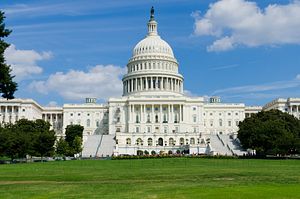It seems Republicans and Democrats in the United States have finally found something they agree on: the need for tougher sanctions on North Korea in the wake of the country’s nuclear test on January 6 and rocket launch on February 7. On Wednesday, the U.S. Senate passed a new sanctions bills with a vote of 96-0. The House of Representatives passed a similar bill in January, with near-unanimous support (the final vote was 418-2).
The bill, which was slightly amended from the House version, will need to be approved once again by the House. It will then pass to the White House for President Barack Obama’s signature.
Both versions of the bill call for new sanctions not only on North Korea, but on third parties who help facilitate “prohibited activities” by North Korea – from importing luxury goods or arms into North Korea to engaging in “money laundering, counterfeiting, cash smuggling, or narcotics trafficking that supports the Government of North Korea.” The administration will be empowered to block sanctioned individuals from entering the United States, and to confiscate assets deemed to have been “forfeited for violations of North Korea sanctions laws.”
The Senate version of the bill was co-sponsored by Senators Cory Gardner, the Chairman of the Foreign Relations Subcommittee on East Asia the Pacific, and International Cybersecurity Policy, and Robert Menendez, senior member of the Foreign Relations Committee. In a press release on Wednesday, Gardner called the bill “the first step of building a new policy that will put pressure on Pyongyang to peacefully disarm and cease its violations of international norms.” Menendez, meanwhile, praised the bill as “a major step forward in creating a new policy framework that combines effective sanctions and effective military countermeasures that can stop North Korea’s nuclear ambitions and bring some sanity back to the political calculus.”
In pursuing tougher unilateral sanctions against North Korea, Congress seems to want to repeat the success it had with sanctions on Iran. Financial pressure on Tehran eventually led to the breakthrough deal reached last summer, where Iran agrees to give up its nuclear program in exchanges for sanctions relief.
“I really do believe that passage today of this, and ultimate signature by the president, has the potential to unleash the same chain of events that occurred relative to Iran, hopefully with a better outcome,” Senate Foreign Relations Committee Chairman Bob Corker said on Wednesday, according to the Washington Post.
The bill could also function as a tool to force China to alter its approach to North Korea – by sanctioning Chinese companies that continue to do business with the Kim regime. Senators who spoke to the Post recalled the success of sanctions on Banco Delta Asia in Macau in forcing a return to negotiations in the mid-2000s.
Experts, however, are wary of opening up the Pandora’s box of secondary sanctions on China to force change in North Korea. Joel Wit, manager of the North Korea-focused program 38 North at the U.S.-Korea Institute at the Johns Hopkins School of Advanced International Studies, warned at a press briefing last month that China could retaliate in kind if its banks are cut out of the U.S. financial system. The trick, he said, is figuring out how to keep secondary sanctions on China from hurting the United States.
China has long been opposed in principle to unilateral sanctions. “China opposes unilateral sanctions, which is our position that has never changed,” Foreign Ministry spokesperson Lu Kang said last week. Given that, Beijing will almost certainly refuse to recognize the legitimacy of U.S. sanctions, particularly if those sanctions affect its own companies and citizens.
Meanwhile, the Senate bill makes the sanctions mandatory, giving the Obama administration little wiggle room in implementing them (aside from a waiver in the case of demonstrable impact on national security.) The White House has not explicitly said that Obama would sign the bill, but Democratic senators told Reuters they expected he would do so.

































